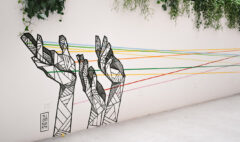Tilting Toward Europe
Greetings. In the past few weeks Europe has been the focus of lots of attention. First, there is the economic situation–also known as a "crisis"–that underscores the continent's vital role in the stability of the fragile global economy…making the Euro and the Eurozone hot topics of conversation on Wall Street, Capitol Hill and even among shoppers at Autozone.
Second, there's the European Football Championships–also known simply as "Euro 2012." It's the pinnacle of Europe's adoration for football–also known as "soccer" to the unwashed masses here in the U.S. where our type of football is less about feet and more about a unique set of skills that were quite possibly developed by famous Europeans like the Vikings and William the Conqueror. But given that European-style football is the world's most popular sport, and the fact that Europe is home to several of the world's best teams, a large percentage of the eyes on the planet will be glued to their TV sets during the next few weeks as Europe crowns a champion at venues across Poland and the Ukraine. Then their eyes will likely be focused on London when the 2012 Olympic games begin.
Third, and probably less well known to people outside of Europe, was the recently completed Eurovision song contest–also known as the Eurovision song contest. An annual music event that is kind of like American Idol on steroids. Not that the use of steroids is involved. But a chance for all the nations of Europe, very broadly defined, to compete in the selection of the continent's best performer and song. I say "broadly" defined because 42 nations entered the competition that was held in Baku, Azerbaijan. And before that, each held their own national competitions to determine who would represent them.
Being married to a Swede who grew up in the days of ABBA (winners of the 1974 competition with the song Waterloo), the Eurovision contest is definitely on my radar screen and is a fascinating way to see how Europe and its music is evolving. This year's winner was also a Swede named Loreen or more formally Lorine Zineb Nora Talhaoui, though unlike ABBA her parents are Berbers who came to Sweden from southern Morocco. Loreen's winning song titled "Euphoria" and her unique performance (sung in English) captivated the judges and tens of millions of voters all across Europe and stood as a sign of where music and popular culture might be heading. In a bow to tradition the second place winners were an adorable group of six Russian grandmothers in traditional folk dresses singing a delicious song about partying and baking. And while they sang in Russian it was hard to miss the shear joy of their performance even if one had no idea what the words meant. Other performers included a Norwegian singer of Iranian heritage, a Romania group singing in Spanish and English infused with a Cuban beat and the almost ageless Engelbert Humperdink representing England with a song that was not very popular. You can watch all of the performance on the Eurovision website or YouTube though I've include Loreen's performance below.
But a key theme was the growing diversity of Europe and the growing innovation of its music scene–made more interesting by the continent's current position on center stage. In fact, we all need Europe–along with its economy, football and music–more than ever before if we are going to solve the current economic crisis and create greater opportunity for everyone.
We win in business and in life when we come to realize that we are all connected. And when we always seek to discover the unique talents of everyone.
Cheers!







